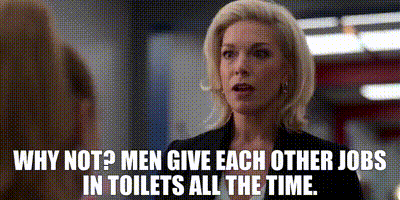OK Ladies, Now Let’s Get In Formation
“When women support each other, incredible things happen.” ~ Unknown
Imagine sitting in a room with every other woman at your organization.
Look to your left, look to your right.
Now imagine that one of these women will be helping you achieve the next level in your career while the other is someone you are helping.
Mind blowing. Right?
Often women are socialized to be competitive with one another in all aspects of life but at the end of the day, this is detrimental, especially at work.
Women are consistently underrepresented in leadership roles all the way up the ladder. In 2020, for every 100 men promoted to management positions, only 86 women are promoted. The numbers dwindle further the higher up you look. There are, of course, many factors worth addressing, but right now we’re going to talk about how women-only support networks can make a big difference.
There is a fantastic scene in the show Ted Lasso when Rebecca, the owner of a soccer team, offers Keely, an aspiring publicist, a job with the team. Keely asks Rebecca if she is only offering her the job because they had a meaningful conversation in the bathroom during an event cementing their status as friends. Rebecca basically responds: Why not? Men offer each other jobs due to relationships cultivated socially all the time.
The truth is, Keely had already proven she’d be great at the job with her past experience, she just needed the network to recognize her talents and pull her up.
Just as Rebecca extended a hand to Keely to pull her up to a higher position, women shouldn’t be afraid to do the same thing in real life.
Why doesn’t this happen more often?
A 2016 study published in the Academy of Management Journal found that senior-level women who attempt to help other women at work are likely to face more negative performance reviews than those who don't. This is a symptom of the problem though, not the cause.
Hierarchies in workplaces are mostly made up of white men so whether they realize it or not, their biases are holding women back. A perfect example of this is this story from auditor Anne Welsch McNulty. She writes, “When I was a first-year accountant at a Big Eight firm (now the Big Four), I kept asking the only woman senior to me to go to lunch, until finally, she told me, “Look, there’s only room for one female partner here. You and I are not going to be friends.”
This feeling that networking with women or mentoring women can negatively impact a performance review, or a raise, or a promotion is a complete falsity.
Women-only networks have proven to be important to the advancement of women in the workplace. They foster an environment where you can speak freely about issues you are facing at work. Your experiences are validated.
Oftentimes women feel as if they have to be able to handle everything. Support networks remind us that we are never alone. The struggles of unequal pay, being assigned gendered tasks like picking up the coffee or taking care of the office “housework”, or a lack of support from the company as a parent are collective issues that can be tackled as a unit.
Women-only networks are also a fantastic place to learn and share knowledge. Lessons can be gained from women who have shared experiences. If your work is in a male-dominated field, a network of women offers different perspectives and ideas that you may not hear in meetings run by mostly men; women’s voices will be front and center.
These networks are also important because the cliche is true: there is power in numbers. When the network has open and honest communication and is united in creating more opportunities for women, change can happen.
I encourage you to join or create a women’s work network in your chosen career. Channel the power of community to raise each other up and start changing the workplace demographics. For further discussion about sisterhood in the workplace, I highly recommend the Women At Work podcast episodes, Sisterhood is Trust, Sisterhood is Scare, and Sisterhood is Power.



